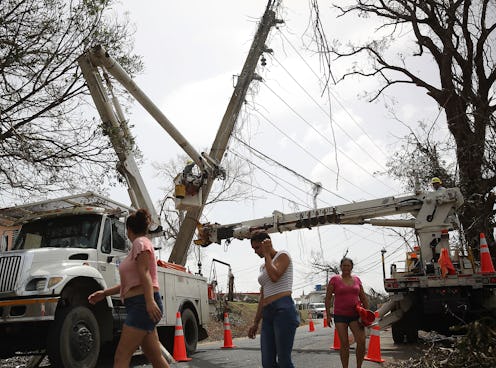News
How Did A Tiny Montana Company Land The Biggest Contract To Restore Puerto Rico's Electricity?

When it comes to restoring power to Puerto Rico, no one is predicting an easy or immediate solution. Best estimates put the total restoration of electricity several months out, which makes sense. Hurricane Maria devastated an already-battered Puerto Rico, coming just 14 days after the island was slammed by Hurricane Irma. But the recent $300 million federal contract awarded to Whitefish Energy to restore power to Puerto Rico has raised some questions. The Montana company, tiny and only in operation for two years, has never taken on a project remotely close to the size and scope of Puerto Rico's electricity needs.
The details of Whitefish Energy's hefty contract with the federal government are raising eyebrows among government watchdogs and industry heavyweights alike. As The Washington Post reported, one reason is because of the connection between Whitefish Energy and Interior Secretary Ryan Zinke. A native of Montana, Zinke's son spent a summer working at Whitefish Energy, and the company's chief executive, Andy Techmanski, acknowledges he and Zinke know one another. However, both Techmanski and Zinke deny the latter had any involvement in securing the enormous federal contract for Whitefish Energy.
Ken Luce, a spokesman for Whitefish Energy, told Bustle that the company has "expertise that few companies in the industry have," referring to their experience with repairing electrical services in mountainous regions. Luce also highlighted the 300 workers the company already has on the ground in Puerto Rico, with another 700 planned. "Whitefish is getting work done while others waited to see who would be paying the bills. Whitefish took a chance," Luce states.
But it's proven difficult for many experts in the industry to figure out how a two-man outfit in northern Montana — Whitefish only had two full-time employees when Hurricane Maria hit — was chosen to repair Puerto Rico's electrical system over much larger, more readily mobilized utilities geographically closer to the island.
Susan F. Tierney, who has worked at the Energy Department and at state-level regulatory agencies, told The Washington Post:
The fact that there are so many utilities with experience in this and a huge track record of helping each other out, it is at least odd why [the utility] would go to Whitefish. I'm scratching my head wondering how it all adds up.
One of the utilities passed up for the Puerto Rico contract was FPL, a Florida utility that mobilized 20,000 workers to begin repairs the day after Hurricane Irma left the Sunshine State. FPL openly advertised itself as ready, willing, and able to take on Puerto Rico's electrical needs, but the company said they never heard back from the Puerto Rican utility at all. (Bustle has reached out to FPL for comment.)
Another issue that has garnered attention is the requested pay scale for workers. At a rate of $330/hour for a site supervisor, along with $332/night for accommodations and $80/day for food, it's a personnel cost that is not quite the norm for similar projects. According to Fortune, a utility repair worker would normally earn $50/hour, though that wage does go up significantly for post-natural disaster repairs. Journeymen linemen repairing the damage from Hurricane Irma in Florida made $75/hour for regular work, and up to $100/hour for overtime. As one worker put it, "I'll probably make 30 grand this month."
The Whitefish Energy contract pays a journeyman lineman at $227.88/hour, more than double the overtime disaster rate following Hurricane Irma, and the repair workers in Florida were not allotted the extra $332 as a nightly hotel stipend, or the additional $80/day for food. Electrical repair work is, of course, dangerous; that's part of why compensation goes up considerably for natural disaster relief.
But with Puerto Rico facing enormous debts even before the hurricanes wiped out much of the local economy along with their electrical infrastructure, some are wondering why the federal government would offer workers such an exorbitantly high pay rate. It's an especially puzzling question given that no other bids were even considered before Whitefish Energy was awarded the $300 million contract.
The House Committee on Natural Resources is looking into how this contract went to Whitefish Energy. So it seems the potential to discover more about how a two-year-old company with just two full-time employees managed to secure a $300 million contract to repair Puerto Rico's infrastructure is real — it may just take a while.